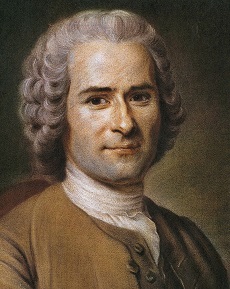
An open thread where, at your leisure, you can discuss anything you like, well, within reason and the Comments Policy. Include here news and views, plus any notable personal experiences from the week and the weekend.
For climate topics please use the most recent Climate clippings.
The gentleman in the image is Voltaire, who for a time graced the court of Frederick II of Prussia, known as Frederick the Great. King Fred loved to talk about the universe and everything at the end of a day’s work. He also used the salons of Berlin to get feedback in the development of public policy.
Fred would only talk in French; he regarded German as barbaric. Here we’ll use English.
The thread will be a stoush-free zone. The Comments Policy says:
The aim [of this site] is to provide a venue for people to contribute and to engage in a civil and respectful manner.
Here are a few bits and pieces that came to my attention last week.
1. Richie Benaud passes on
The ABC puts it well:
Cricket icon Richie Benaud, who distinguished himself first as a leg-spinning all-rounder, then as a daring Australian Test captain and later as the ‘voice of cricket’ in the commentary box, has died at the age of 84.
Benaud’s skills, drive and determination took him to the top on and off the cricket field, and made him one of Australia’s most recognised people, instantly identifiable simply as Richie.
He played 63 Tests for Australia, was the first player to score 2,000 Test runs and take 200 Test wickets, and never lost a series as Australian captain.
After hanging up his Baggy Green cap, he spent more than four decades as the king of cricket commentators, a man viewed around the world as one of the best callers, watchers and analysts of the game – and perhaps its best ambassador as well.
While acknowledging his record I’d rate him as a top-flight bowler who was a handy batsman rather than a genuine all-rounder, who would be selected for his batting and his bowling absent the other. Genuine all-rounders are rare. I can think of Garfield Sobers, Keith Miller and Ian Botham, also Adam Gilchrist in a sense.
Benaud, I think, gave some respectability to the Packer circus and was apparently quite influential in giving advice.
2. Opinion polls
In Great Britain Ed Miliband overtakes David Cameron in approval ratings, as Labour pulls ahead in the polls.
Here in Oz Newspoll studied quarterly trends with a larger than usual sample. The headlines and much of the reporting was about Abbott’s poor performance in WA. You had to dig to find the national TPP poll which had Labor ahead 55-45. Also:
Opposition Leader Bill Shorten leads Mr Abbott 44-34 as preferred prime minister.
He is now ranked as better prime minister in all states for the first time.
Roy Morgan now has Labor ahead 53-47 and as does the Essential Report.
If this keeps up Labor could lose the election, because they’ll give Abbott the flick and put in Julie or Malcolm.
3. We lock people up too much
Australia’s imprisonment rate at 186 per 100,000 is historically high and getting higher. Moreover:
In contrast to most other developed countries, this rate is palpably high. The rate in Canada is 118 per 100,000. The incarceration rate in Australia is nearly three times higher than in Scandinavian countries.
Standing apart from these trends is the world’s greatest incarcerator, the United States, which imprisons more than 700 people per 100,000 – an increase of more than 400% in three decades.
It’s costing us a pile of money – we spend $A80,000 per prisoner per year compared to $A30,000 in the US. This wouldn’t be so bad if it worked, but it doesn’t:
Sentencing is the area of law where there remains the biggest gap between what science tells us can be achieved through a social institution (criminal punishment) and what we actually do.
In fact
our prisons [are] where the greatest number of human rights infractions occur.
The solution?
The start and endpoint to the solution is to confine jails (almost exclusively) to those we have reason to be scared of: sexual and violent offenders.
Thanks to John D for bringing this article to my attention.
4. Keep an eye on Greece – something unusual is happening
James Galbraith has been to Greece to consult on their problems and reported in an amazing speech to the European Trade Union Institute.
So as these manoeuvres, as I call them, mature, there emerges an interesting possibility. And that is the possibility of a politically stable, anti-austerity government in Europe, led, as I think you probably have observed, by forceful personalities, and presiding over an economy which is so far down that it has no place to go but up. And that may well be, within a short period of time, on a track of some recovery, some improvement in jobs performance and stabilisation of its external debt situation.
This would be in the wake of a crisis that was brought on by the neoliberal financial policies of the early part of the 2000s. Which was then aggravated and prolonged by the austerity ideology that succeeded the crisis, by the profoundly counterproductive policies with which Europe has reacted to the crisis. And so the possibility that an anti-austerity government might lead the beginning of a recovery from the austerity regime is, I think, a present reality and it is, of course, a nightmare in certain quarters.
Finance Minister Yanis Varoufakis and Prime Minister Alexis Tsipras have faced a wall of grief and pain from a hostile media and European finance authorities. If they prevail it will be because in the end Angela Merkel is pragmatic rather than doctrinaire. The stakes are high:
It goes beyond that to the future of Europe and beyond that, to the meaning of the word democracy in our time.
If you have a spare hour, Yanis Varoufakis talks with Joe Stiglitz. I haven’t yet had time for more than the first half hour.




